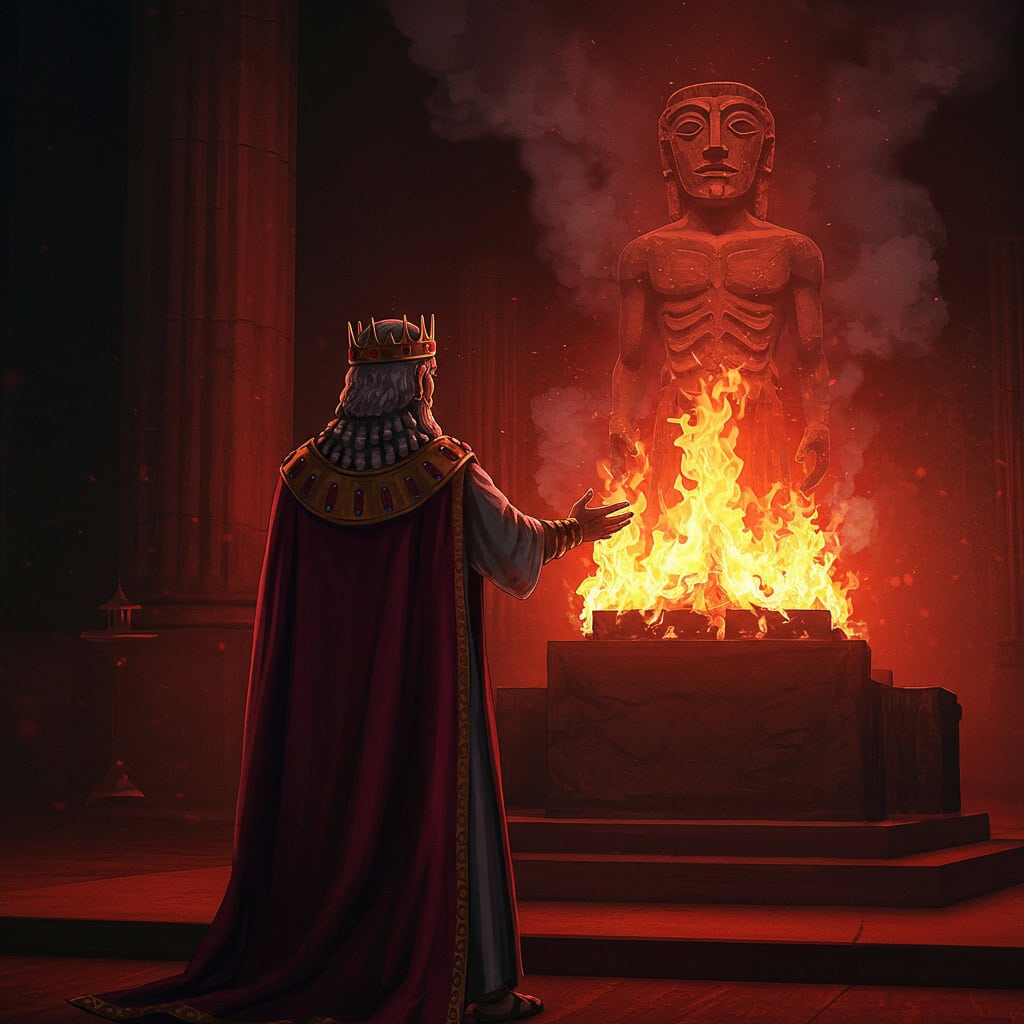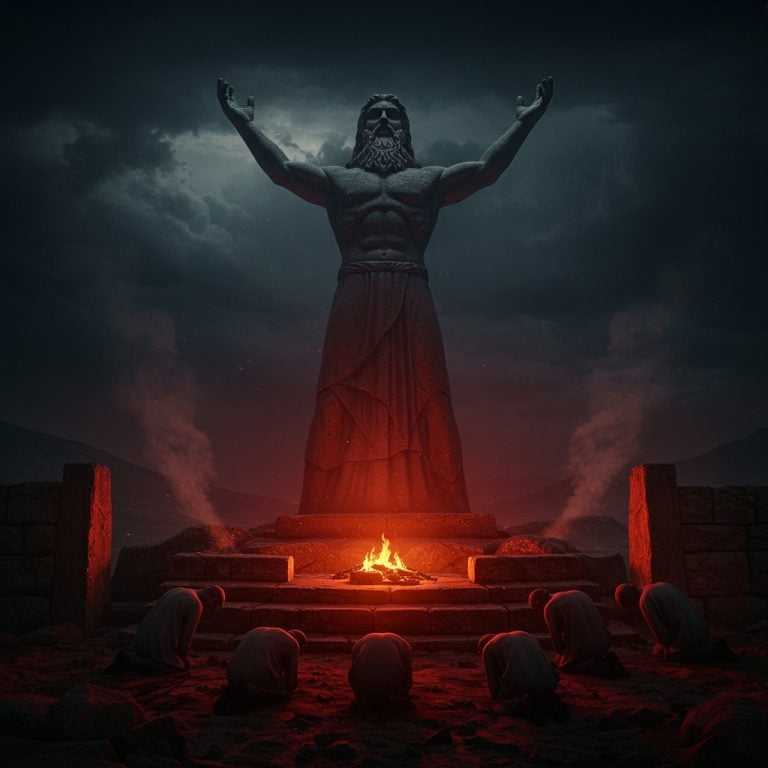Child Sacrifice in the Bible: What Ba’al Worship Really Involved
You cannot grasp the full horror of Ba’al worship without coming face to face with one of its darkest rituals: child sacrifice. It wasn’t symbolic. It wasn’t misunderstood. It was deliberate murder, offered in the name of false gods. And as shocking as it sounds, it wasn’t confined to pagan nations. Israel joined in.

Some today try to sanitize it. They say child sacrifice in the Bible was hyperbole, ancient propaganda, or mistranslated tradition. But the Bible is not unclear. What happened in the high places of Israel was real. It was public. And it was repeated.
When God warned His people not to follow the detestable practices of the nations, this is what He meant. And when His judgment fell, this is what He was judging. And if you want to understand child sacrifice in the Bible, you have to stop treating it as legend—and start seeing it as rebellion.
Ba’al Worship Didn’t Stay in Canaan
The worship of Ba’al didn’t stay tucked away in the corners of Canaanite culture. It spread. It infiltrated. And eventually, it took root among God’s people.
Ba’al was known as the storm god, the bringer of rain and fertility. That made him attractive in a land dependent on seasonal crops. But Ba’al worship demanded more than devotion—it demanded demonstration. And the more desperate the people became, the more extreme the rituals grew.
You won’t find a single verse that says Ba’al commanded child sacrifice by name. But you will find verses where Ba’al and Molech appear side by side, their altars standing on the same high places, and their followers engaging in the same bloody worship.
What Israel adopted wasn’t a mild blend of old customs and new faith. It was a wholesale rejection of God’s law for a religion that promised prosperity but fed on death.
God’s People Didn’t Just Imitate Paganism—They Embraced It
And the tragedy wasn’t just in what Ba’al worship demanded—it was in who gave it. These weren’t confused pagans from distant lands. These were God’s covenant people. The descendants of Abraham. The ones who had walked through parted seas, gathered manna from the ground, and stood trembling at the foot of Sinai as God thundered from the mountain.
And yet they traded it all. The law. The promises. The presence of God. They gave it up for Ba’al—a god who could not speak, could not act, and could not save. For a lie that promised life and delivered death.
R.C. Sproul on Apostasy and Israel’s Covenant Failure
“Apostasy is not the same as paganism. Pagans are people who have never professed faith in Christ. Apostates are people who have made a profession of faith in Christ, but who have fallen away from the truth of the gospel. Churches can become apostate, going from a confession of faith that is godly, biblical, and true to an embrace of pagan concepts and behavioral patterns. When a church repudiates its confession in this way, it is not a valid church anymore. It is apostate.”
This precisely underscores what happened with Israel: they didn’t merely adopt foreign customs—they abandoned covenant truth and embraced idolatry.
“Just as apostasy polluted Israel, it can pollute us. We have seen the unbelievable corruption of mainline churches that have become monuments of unbelief and apostasy. Just as God cuts off the branches of Israel, he will cut off the unproductive Gentile branches.”
Sproul’s warning frames Israel’s spiritual betrayal in a corporate, covenantal context—reminding us that abandoning truth leads to judgment.
That’s why child sacrifice in the Bible cannot be treated like ancient exaggeration. It was high-handed rebellion against the very God who had redeemed them. Not ignorance. Not accident. Treason.
The High Places Were the Stages of Slaughter
When the Bible speaks of high places in ancient Israel, it’s not talking about geography. It’s talking about idolatry.
These were raised platforms, often on hills or manmade mounds, where people set up altars, Asherah poles, incense stands, and carved images. Some tried to claim they were honoring Yahweh. But over time, these high places became centers for Ba’al, Molech, and every perversion the nations practiced.
Idolatry Built on Ancient Ground
According to the Biblical Archaeology Society, high places were often adapted from older sacred sites and reused for pagan rituals. And what happened there wasn’t spiritual experimentation—it was spiritual rebellion.
That’s why God didn’t just tell His people to avoid them. He told them to tear them down. He told them to destroy every stone, every altar, every shrine—because the blood of children had soaked into the very ground.
And yet, they didn’t stop.
Molech and Ba’al: Two Names, One Evil
It’s become popular in some circles to separate Molech in the Bible from Ba’al—as if one demanded child sacrifice and the other didn’t. But Scripture doesn’t let us make that distinction.
In Jeremiah 19:5, God says, “They have built the high places of Baal to burn their children in the fire as offerings to Baal—something I did not command or mention, nor did it enter my mind.”
As John Calvin observes in his commentary on Jeremiah, “The Jews had not been satisfied with one kind of idolatry…but built high places or altars for themselves … they caused their sons and their daughters to pass through the fire in honor to Molech. And yet in a former passage he calls him Baal. Hence it appears… that the word Baal includes all kinds of idols.”
And in Leviticus 18:21, the command is clear: “Do not give any of your children to be sacrificed to Molech, for you must not profane the name of your God. I am the LORD.”
The Bible Doesn’t Let Us Separate What God Judges Together
These were not separate systems. They were two faces of the same rebellion. Ba’al was the lie Israel embraced, and Molech was the altar that devoured their sons.
They didn’t just borrow customs. They traded covenants. And they did so in the very land God had given them.
Kings Who Should Have Known Better

It would be bad enough if child sacrifice in the Bible were limited to desperate peasants and pagan foreigners. But it wasn’t.
The kings of Judah—the men anointed to shepherd God’s people—were often the very ones who led the charge.
Ahaz, king of Judah, “walked in the ways of the kings of Israel and even burned his son as an offering” (2 Kings 16:3). Manasseh, the most wicked of all, “burned his son as an offering and used fortune-telling and omens” (2 Kings 21:6).
Covenant Leadership, Corrupted by Idolatry
These were not mistakes. They were acts of worship. False worship. And they revealed how deeply Ba’al’s influence had penetrated the nation.
This wasn’t Canaan anymore. This was Jerusalem. This was Judah. And the blood was on their hands.
Judgment Came Because of the Blood
We don’t often connect the exile to child sacrifice in the Bible. We talk about idolatry, injustice, or broken covenants—but we skip over the blood. God doesn’t.
In Jeremiah 19, He declares: “They have filled this place with the blood of the innocent… So beware, the days are coming, declares the LORD, when people will no longer call this place Topheth or the Valley of Ben Hinnom, but the Valley of Slaughter.”
God Didn’t Just Punish Idolatry—He Punished Innocent Bloodshed
That wasn’t poetic language. It was prophecy. And it came true.
God judged His people not just for turning to idols, but for sacrificing their children in the name of those idols. The land had become defiled. And God, in His holiness, would not let it stand.
This is the cost of Ba’al worship. This is the cost of forgetting the fear of the Lord.
A Modern World Still Offers Its Children
It’s easy to read these accounts like ancient horror stories—rituals from a darker, less enlightened time. But they’re not locked in the past.
The names have changed. The altars look different. But the sacrifice continues.
Today, we don’t call it worship. We call it healthcare. We call it choice. But the blood still cries out—from clinics, dumpsters, and sterilized tables—because idolatry still demands blood.
The Altars Look Different. The Sacrifice Is the Same.
We offer up children for convenience. For autonomy. For the illusion of control. And we do it in a world that dares to call itself humane.
The enemy doesn’t wear a Ba’al mask anymore. But he still whispers the same old lies: “You’ll be safe. You’ll be strong. You’ll be free.” And just like ancient Israel, the culture nods in agreement—right up to the altar.
We’ve only changed the words.
We say “terminate the pregnancy” instead of “kill the child.”
We say “reproductive freedom” instead of “sacrifice to self.”
But the theology hasn’t changed.
When God is removed from the center of worship, something else always takes His place. And whatever takes His place will demand a cost.
In ancient Israel, it was fire and stone. Today, it’s suction and scalpels.
But the result is the same: a child is gone. And a culture is complicit.
According to Guttmacher, “An estimated 1,038,000 abortions were provided by clinicians in states without total bans in 2024, a less than 1% increase from 2023 and an increase of 12% from 2020. This count includes medication abortions provided via telemedicine by US clinicians, with pills mailed to patients in states without total bans or bans on telemedicine. It does not include self-managed abortions, such as those using medications mailed from pharmacies outside the United States. Evidence suggests self-managed abortions have increased since Dobbs.”
And if child sacrifice in the Bible provoked the judgment of God, what makes us think our own bloodshed will be overlooked?
But There Is a Better Sacrifice
If this article stopped here, it would only leave you in despair. But Scripture never ends with judgment alone.
Because even among the worst offenders—even among those who practiced child sacrifice in the Bible—God still showed mercy.
Manasseh repented. And God forgave him.
Not because his sin wasn’t great, but because God’s mercy was greater. And today, the blood that speaks louder than the blood of children is the blood of Christ.
Christ’s Blood Speaks Louder Than the Blood of Children
He was the only Son truly offered in righteousness. The only sacrifice that satisfied justice. The only altar that ended death instead of feeding it.
So if you’ve been complicit, if you’ve been silent, or if you’ve been guilty—know this: the cross is still enough.
Conclusion: Don’t Sanitize What God Condemns
Child sacrifice in the Bible isn’t a cultural footnote. It’s a blazing indictment of what happens when people abandon God and follow their own desires. It still happens today.
And Ba’al worship wasn’t just bad theology—it was blood-soaked treason.
We must not soften it. We must not explain it away. We must not ignore its modern forms – abortion.
God has not changed. His holiness has not faded. And His mercy still calls sinners to turn—to leave the altar of Ba’al and come to the cross of Christ.
Want to know more about the grace of God in His sovereignty over salvation? Check out this free reference.
Walt Roderick is a Christian writer who cares more about biblical clarity than online applause. He writes to strengthen believers and confront spiritual drift.






